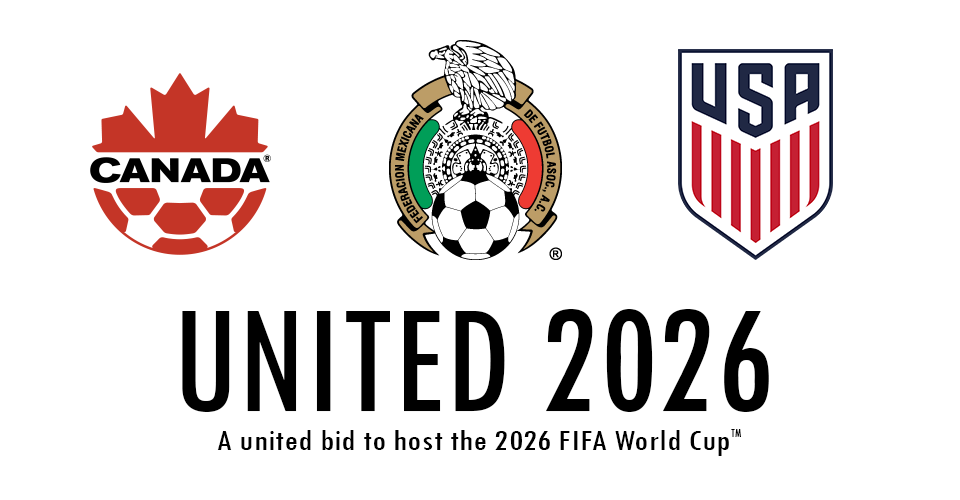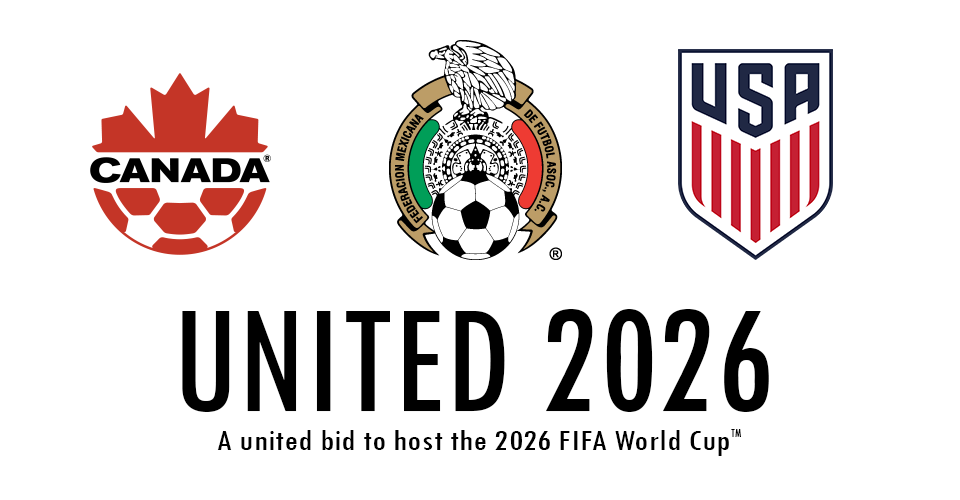NEW YORK (Oct. 24, 2017) – A new survey of adults in Canada, Mexico, and the United States confirms broad support for a United Bid to host the 2026 FIFA World Cup™. The survey found that 77 percent of North American residents are in favor of hosting the first-ever 48-team FIFA World CupÔ, and 81 percent of respondents across the three countries agree that hosting the tournament would be good for their specific country. With more than eight years until the event would even take place, nearly six in 10 (57 percent) of those surveyed say they would be interested in attending FIFA World Cup™ matches if the games were played near where they live or work.
The survey was conducted by the international polling firm Ipsos and covered approximately 1,000 adults in each country. The full results of the survey, which were weighted to the North American population to not over represent Mexico, can be found here.
“Soccer’s reach and popularity have grown dramatically across North America, and this survey shows the potential for our region and for our sport, to host the 2026 FIFA World CupÔ, and make a huge contribution to the sport and its fans, here and around the world,” said Sunil Gulati, U.S. Soccer President and Chairman of the United Bid Committee. “To see this level of support, more than eight years before kick-off, demonstrates how deeply rooted soccer is across North America and what the success of the United Bid could mean for the sport’s growth in North America.”
“Our survey found strong support for hosting the 2026 FIFA World CupÔ across North America. Overwhelming majorities in each country are in favor of hosting the cup and believe that welcoming the world to Canada, Mexico and the United States will be a good thing not only for their countries, but also for the growth of the game of soccer in the region,” said Clifford Young, President of Ipsos North America. “The majority of people in North America support the United Bid because it will enhance their country’s image and economic standing. This support extends beyond so-called fans of the sport demonstrating a broad-sense that this United Bid will be good for the countries, region, and the game of soccer overall.”
Additional results from the survey include:
- Half of those who are supportive of the bid believe that co-hosting the games with their neighboring countries would boost the image of their own nation around the world. In the United States and Canada, 53 percent of respondents agree serving as stewards of the FIFA World CupÔ will help grow the game of soccer in their respective countries.
- Some of the top reasons for supporting hosting the FIFA World CupÔ in each country include the anticipated economic benefits that hosting the tournament would bring to the region and the spread of a positive image of the country around the world.
- Only eight percent of those interviewed are opposed to hosting the games, with those who do not follow the sport regularly especially likely to feel this way. When told, however, that a potential advantage of the United North American bid is that no new stadiums will need to be built to host FIFA World Cup™ matches, dramatically reducing the financial burden on taxpayers or governments in Canada, Mexico and the United States, 79 percent of all respondents say that this fact makes them more supportive of hosting the tournament.
As the United Bid’s efforts move into the next phase, following the release of FIFA’s official hosting requirements and paperwork, the Committee also announced that more than 750 people are involved in developing or supporting the United Bid Committee’s efforts in Canada, Mexico and the United States. The United Bid Committee’s staff of ten includes members from each of three countries with extensive experience bidding for or hosting previous World Cups. The Committee has also assembled a roster of leading advisers and practitioners in logistics, event management, and sustainability and human rights. In addition, the Committee has assembled a stable of firms to support the bid’s submission and promotion in video production, government relations, public affairs, design and branding. The 32 potential host city candidates have each formed support teams with local government, civic, and other leaders to contribute to the development of the bid.
“The survey results confirm what we have already seen in the early stages of the bid process – that there is tremendous support and enthusiasm across Canada, Mexico and the United States our hosting strategy. Our focus continues to be on working with our 32 host city candidates to present the most compelling, thorough and forward-looking proposal to FIFA. Working together, our United Bid will use this momentum to seek to improve the lives and communities across North America, CONCACAF and the world, using the game of soccer,” said John Kristick, Executive Director of the United Bid Committee. “One of the strengths of our hosting concept is that we have ready-made stadiums and infrastructure prepared to stage the first 48-team FIFA World Cup, so if we are given the honor of hosting, much of our effort and investment will be focused on welcoming, inspiring and empowering the next generation of players and fans from around the world.”
“Like our partners in Mexico and the United States, Canada has a history of hosting World Cups and welcoming the world to our country in celebration of soccer and community,” said Steven Reed, Canada Soccer President and United Bid Committee Board Member. “We’ve seen diverse and wide support for hosting the tournament and view this as an opportunity to grow the game, expand Canada’s positive image in the world, and do a great deal for our country’s and region’s economies. Soccer’s future in Canada is bright.”
“Soccer in Mexico is a religion,” said Decio De Maria, the President of the Mexican Football Association and United Bid Committee Board Member. “The support Mexicans are showing for our united efforts is outmatched only by our passion for the game of soccer. We have in place the infrastructure and long history of hosting World Cup matches. There is no doubt that hosting with our partners in Canada and the United States will allow us to grow the game into new areas across Mexico and export the excitement and desire Mexican fans bring to the game of soccer.”
Earlier this month, the United Bid Committee announced the 32 cities across North America that could serve as Official Host Cities for the 2026 FIFA World Cup™. The 32 host city candidates include four cities in Canada, three in Mexico and 25 cities in the United States.
Each of the 32 cities that may be included in the final bid submitted to FIFA features existing or already planned stadiums, other key infrastructure, and reflect the vast geographic and cultural diversity of North America.
The list of potential host cities can be found here. The United Bid Committee also announced that it is exploring ways for additional cities to be included in the bid effort.
About the United Bid Committee
The United Bid Committee was created by the National Federations of Canada, Mexico and the United States to manage the bidding process for the 2026 FIFA World Cup™. Robert Kraft serves as Honorary Chairman of the United Bid Committee Board of Directors. Sunil Gulati is Chairman of the United Bid Committee Board of Directors, which includes representatives of the three North American soccer federations. The Executive Director of the United Bid Committee is John Kristick.
About The 2026 FIFA World Cup™
The 2026 FIFA World Cup™ will be the first tournament with the expanded 48-team format and will require world-class facilities and infrastructure to ensure a successful tournament. The United Bid of Canada, Mexico and the United States is uniquely suited to accommodate FIFA’s high-level standards for hosting a FIFA World Cup™. If the United Bid is selected by FIFA as the host for the 2026 FIFA World Cup™, at least 12 cities will be selected as venues for games. Canada, Mexico and the United States also have a long and successful history as hosts - 13 FIFA World Cups have been hosted Canada, Mexico and the United States, five of which set attendance records.
About the Survey
These are the findings from a series of Ipsos polls conducted August 31 – September 1, 2017 in the U.S., September 14 - 19, 2017 in Mexico (please note that fieldwork ended prior to the Earthquake that struck Mexico 09/19/17), and September 19 - 21, 2017 in Canada on behalf of the United Bid Committee. For the survey, a sample of roughly n=1,000 adults ages 18 and over from each market was interviewed online, in English (U.S. and Canada), Spanish (Mexico), and French (Canada). The total sample was weighted to be appropriately representative of the three countries. The precision of Ipsos online polls is measured using a credibility interval. In this case, the poll has a credibility interval of ± 2.0 percentage points for all respondents surveyed, and ± 3.5 percentage points within each country.






